

You Are Mentally Stuck at the Age When You Got the Least Love and Affection – Pitbull World.
Cognitive Biases. Psychology... Yes! 50 Scientifically Proven Ways to Be Persuasive « alex.moskalyuk. 100 herramientas web. Religion May Cause Brain Atrophy. Faith can open your mind but it can also cause your brain to shrink at a different rate, research suggests.

Researchers at Duke University Medical Centre in the US claim to have discovered a correlation between religious practices and changes in the brains of older adults. The study, published in the open-access science journal, Public Library of Science ONE, asked 268 people aged 58 to 84 about their religious group, spiritual practices and life-changing religious experiences. Where is The Mind?: Science gets puzzled and almost admits a non-local mentalscape. This will be the last "home-produced" blog entry for a while [save the short "Everyday Spirituality" which will follow it as a sign-off] .
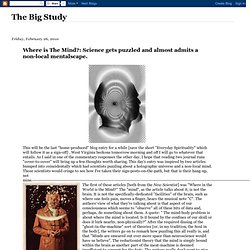
West Virginia beckons tomorrow morning and off I will go to whatever that entails. Watch Free Documentaries Online. Why do we think and feel as we do?

For years man has sought to understand the workings of the mind. Now, with advances in modern-day technology and developments in neuroscience, a whole new world of brain research is opening up. Understanding our minds is becoming a reality. Guided by top neuroscientist Susan Greenfield, Brain Story attempts to answer the question “What is my mind and who am I?” Neurotheology: This Is Your Brain On Religion. Principles of NeurotheologyBy Andrew B.
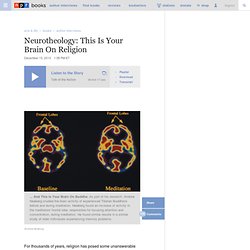
NewbergPaperback, 284 pagesAshgateList price: $29.95 "Neurotheology" is a unique field of scholarship and investigation that seeks to understand the relationship specifically between the brain and theology, and more broadly between the mind and religion. As a topic, neurotheology has garnered substantial attention in the academic and lay communities in recent years. Several books have been written addressing the relationship between the brain and religious experience and numerous scholarly articles have been published on the topic.
The scientific and religious communities have been very interested in obtaining more information regarding neurotheology, how to approach this topic, and whether science and religion can be integrated in some manner that preserves, and perhaps enhances, both. Smarter online research - annotate, organize & collaborate on web pages. Psst! The Human Brain Is Wired For Gossip. Hide captionLearning juicy details about someone can change the way you see them — literally, according to a new study.
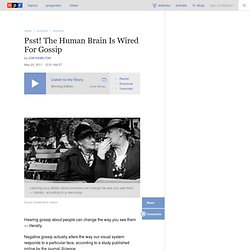
August Darwell/Getty Images. Uld a mind-reading machine soon be a reality? Scientists 'decode' human brainwaves. By Daily Mail Reporter Updated: 08:37 GMT, 18 May 2011 A 'mind-reading machine' that can display mental images is a step closer after scientists decoded brain signals related to vision, it was claimed today.
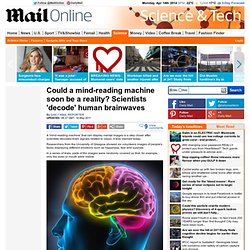
Researchers from the University of Glasgow showed six volunteers images of people's faces displaying different emotions such as happiness, fear and surprise. Imaginary Foundation. Tuning In To The Brain's 'Cocktail Party Effect' Scientists are beginning to understand how the human brain accomplishes a remarkable trick known as the cocktail party effect.
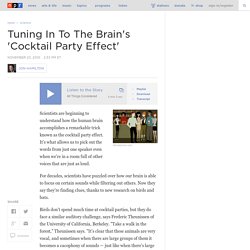
Scientific evidence for survival of consciousness after death. Saving the Appearances: A Study in Idolatry. Saving the Appearances: A Study in Idolatry, a book by British philosopher Owen Barfield, is concerned with physics, the evolution of consciousness, pre-history, ancient Greece, ancient Israel, the medieval period, the scientific revolution, Christianity, Romanticism, and much else.
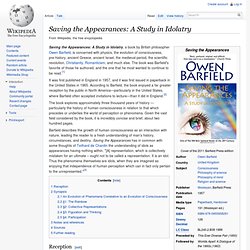
The book was Barfield's favorite of those he authored, and the one that he most wanted to continue to be read.[1] It was first published in England in 1957, and it was first issued in paperback in the United States in 1965. According to Barfield, the book enjoyed a far greater reception by the public in North America—particularly in the United States, where Barfield often accepted invitations to lecture—than it did in England.[2] 10 Websites With Fun Tests To Gauge Your IQ. Intelligence Quotient (IQ) is a term that’s related to the wattage of your brain; in short intelligence and reasoning skills measured across a few standardized tests.

Notes from the Undergrad. By Andrew Newburg | Yawn.
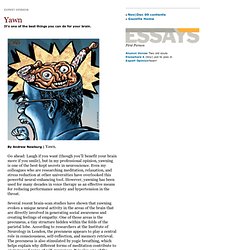
Online Mind Mapping and Brainstorming app - SpiderScribe. Smart-Kit: Online Puzzles & Games. Explorations of the Mind: Intuition. Bobby McFerrin hacks your brain with the pentatonic scale. THE MIRRORING MIND - by @JasonSilva. Family History Of Alcoholism Linked To Love Of Sweets Among Women. More than 250 million women worldwide smoke tobacco. Compared to men, women have a greater risk of smoking-related diseases, and also have more difficulty quitting. A new study, the first of its kind, has found that cigarette smoking and having a family history of alcoholism have different effects on sweet-taste perception and food cravings.
"Tobacco is one of the most heavily used addictive drugs," said M. Yanina Pepino, a researcher at the Monell Chemical Senses Center in Philadelphia and corresponding author for the study, "leading to an increased risk of lung and heart diseases and a variety of cancers. " In fact, lung cancer has surpassed breast cancer as the leading cause of death among US women, she added. "Women who smoke also have an increased risk of cervical cancer, reproductive and pregnancy complications, and early menopause," said Pepino. 100 Best Blogs for Psychology Students. With the availability of so many different blogs and other internet resources, psychology students today have a unique opportunity to gain insights and perspectives not otherwise available to their predecessors. Some information comes straight from professionals, others from students, and still others straight from the patients themselves. Though one should always practice discretion when perusing data and research on the internet, most researchers professionally offer links to reliable sources such as journal articles and websites for the American Psychological Association, National Institute of Mental Health, and other respected organizations.
The internet provides a wealth of opinions and experiences for psychology students to discover every facet of their chosen discipline. 1.PsyBlog : University College London researcher Jeremy Dean posts articles relating to the scientific aspect of psychology with the hopes of highlighting how it factors into everyday life. 28.Dr. 5 Psychological Experiments That Prove Humanity is Doomed.